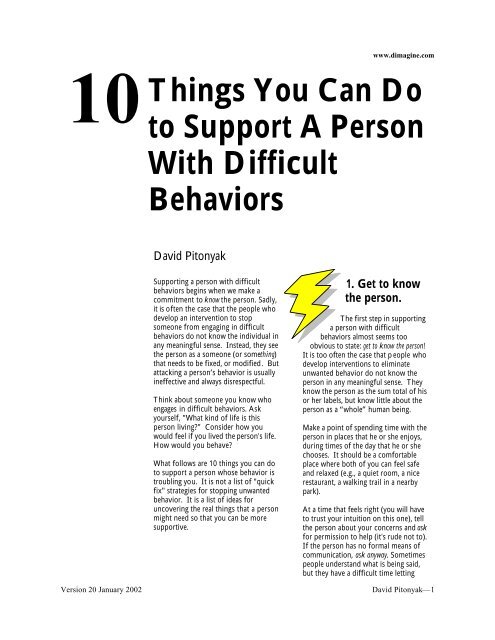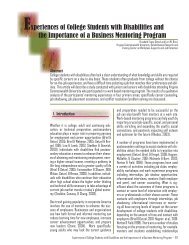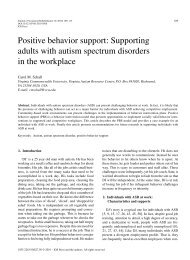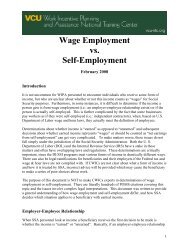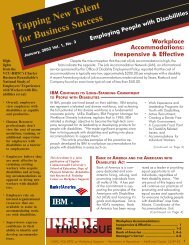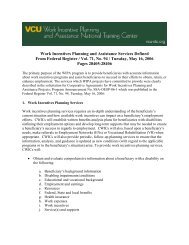10 Things You Can Do To Support A Person - Worksupport.com
10 Things You Can Do To Support A Person - Worksupport.com
10 Things You Can Do To Support A Person - Worksupport.com
- No tags were found...
Create successful ePaper yourself
Turn your PDF publications into a flip-book with our unique Google optimized e-Paper software.
www.dimagine.<strong>com</strong><strong>10</strong><strong>Things</strong> <strong>You</strong> <strong>Can</strong> <strong>Do</strong>to <strong>Support</strong> A <strong>Person</strong>With DifficultBehaviorsDavid Pitonyak<strong>Support</strong>ing a person with difficultbehaviors begins when we make a<strong>com</strong>mitment to know the person. Sadly,it is often the case that the people whodevelop an intervention to stopsomeone from engaging in difficultbehaviors do not know the individual inany meaningful sense. Instead, they seethe person as a someone (or something)that needs to be fixed, or modified. Butattacking a person’s behavior is usuallyineffective and always disrespectful.Think about someone you know whoengages in difficult behaviors. Askyourself, "What kind of life is thisperson living?" Consider how youwould feel if you lived the person's life.How would you behave?What follows are <strong>10</strong> things you can doto support a person whose behavior istroubling you. It is not a list of "quickfix" strategies for stopping unwantedbehavior. It is a list of ideas foruncovering the real things that a personmight need so that you can be moresupportive.1. Get to knowthe person.The first step in supportinga person with difficultbehaviors almost seems tooobvious to state: get to know the person!It is too often the case that p eople whodevelop interventions to eliminateunwanted behavior do not know theperson in any meaningful sense. Theyknow the person as the sum total of hisor her labels, but know little about theperson as a “whole” human being.Make a point of spending time with theperson in places that he or she enjoys,during times of the day that he or shechooses. It should be a <strong>com</strong>fortableplace where both of you can feel safeand relaxed (e.g., a quiet room, a nicerestaurant, a walking trail in a nearbypark).At a time that feels right (you will haveto trust your intuition on this one), tellthe person about your concerns and askfor permission to help (it's rude not to).If the person has no formal means of<strong>com</strong>munication, ask anyway. Sometimespeople understand what is being said,but they have a difficult time lettingVersion 20 January 2002David Pitonyak—1
www.dimagine.<strong>com</strong>It’s almost too obviousto state: spend time withthe personothers know that they understand.The important point, always, is to askthe person for permission to stick yournose into their business, even at therisk of seeming silly in front of peoplewho think the person cannotunderstand up from down (they’reusually wrong).2. Remember that allbehavior is meaningfull.Difficult behaviors are "messages"which can tell us important thingsabout a person and the quality of herlife. In the most basic terms: difficultbehaviors result from unmet needs. The verypresence of a difficult behavior can bea signal that something important thatthe person needs is missing. Here aresome examples of the kinds of thekinds of messages a person may beconveying with his or her behavior:“I’m lonely.”Michael’s older brother was invitedover to a friend's house for a sleepover. Michael is never invited to thehomes of children because he goes toa "special" school 35 miles from hisneighborhood. Michael has no friendsto play with."I'm bored."Roberta's sister is a doctor at the localhospital. She has her own house and isher parent's pride and joy. Robertaworks all day at a sheltered workshopwhere she packages plastic forks andknives. She lives at home and is tiredof packaging. She wants to get a realjob. Roberta's case manager says sheday dreams too much."I have no power."John likes to sit down on the sidewalkwhen the bus arrives to take him toschool. His mother be<strong>com</strong>es veryangry and tells him that there will beno dessert when he gets home. Johnlaughs when the bus driver threatenshim with time out."I don't feel safe."Conrad uses a wheelchair and is notable to defend himself adequately fromattacks by another man. Conradworries that he will be hurt and oftencries when left alone. Staff think hehas a psychiatric illness."<strong>You</strong> don't value me."Gloria has a "severe reputation."People from all over the state haveheard stories about her terribletantrums. No one knows that she is avery caring person who worries aboutenvironmental issues. The only part ofGloria people pay attention to is herproblem behaviors.Version 20 January 2002David Pitonyak—2
"I don't know how to tell youwhat I need."June does not know how to usewords or sign to let other peopleknow what she was thinking. Shelives in an institution where shelearned that the best way to getpeople's attention was to biteyour arms. It hurts, but it is theonly thing that "works.""My ears hurt."Walter hits his ears withhis fists. His job coachwants to stop and wrote abehavior plan for "nothitting." Weeks later, at ascheduled doctor'sappointment, it was learned thatWalter had a low-grade earinfection. Anti-biotics cleared upthe infection and Walter hasstopped hitting his ears.Obviously there are many needsthat a person may be conveyingwith her behaviors. A singlebehavior can "mean" manythings. The important point isthat difficult behaviors do notoccur without reason. Allbehavior, even if it is selfdestructive,is "meaning-full."Ask the person (and/or theperson’s supporters) what he orshe needs to be happy. Find outwho he or she counts on in apinch. How o ften does he or shesee loved ones and friends?What are his or her favoriteactivities? Where does he or shelike to go? Ask the person whatleads to unhappiness. Who arethe people who the person doesnot like? How often does he orshe see them? What are theperson’s least favorite activities?Since many people areexperiencing physical and/orpsychiatric distress, it’s alsoimportant to know somethingabout the person’s physical andemotional health. <strong>Do</strong>es theperson have a way to let othersknow what he or she needs andfeels? Is the person experiencingphysiological or psychologicaldistress? What kinds ofmedications is he or she taking?<strong>Do</strong> they help?Finally, if you’re stumped, ask,“Are there times when theperson exhibits this behaviorfrequently?” and “Are there timeswhen person exhibits thisbehavior infrequently or not atall?” Answering these twoquestions can tell you a great dealabout the meaning of theperson’s behavior. With time,you should be able to see adiscernable pattern.For example, you might find thatthe person engages in thedifficult behavior in the morninghours, but rarely in the afternoon.Ask, “What happens in themorning that might cause theperson to behave this way?” or,conversely, “What is happeningin the afternoon that causes theperson not to behave thisway?” (Hint: it often hassomething to do with the things aperson is being asked to do, and/or who is asking the person to doit).3. Help the personto develop a supportplan.People who exhibit difficultbehaviors are usually subjected toa behavior plan at some point intheir lives. It is rare that they areasked if they want a plan, letalone invited to the meetingswhere one is developed. Instead,a plan is developed by strangers(e.g., the agency behaviorist whohas spent less than two hours"observing" the person).Think about how difficult itwould be to stop a behavior thatwww.dimagine.<strong>com</strong>a stranger thinks you should stop.It can be difficult enough to stopbehaviors we choose to stop (e.g,smoking, excessive eating)!Instead of a behavior plan to"fix" the person, help the personand the person's supporters todevelop a support plan thatreflects a real and authentic life.John and Connie Lyle O'Briensuggest the following questionsfor building a support plan. Notehow different these questions arefrom those we typically ask, suchas "How can we reduce thisperson's problem behaviors?" or"How can we manage thisbehavior?"1. How can we help the person toachieve health and wellbeing?2. How can we help the person tomaintain his or her relationships andmake new ones?3. How can we help the person toincrease his or her presence andparticipation in everyday <strong>com</strong>munitylife?4. How can we help the person to havemore choices in life?5. How can we help the person tolearn skills that enhance his or herparticipation in <strong>com</strong>munity life?6. How can we help the person to makea contribution to others?The team can ask, "Is our visionfor the person similar to thevision we hold for ourselves andeach other? When we thinkabout what the person needs, dowe focus on "fixing" deficits ordo we think about supporting theperson in achieving a real life?"4. Develop a supportplan for the person'ssupportersJust as it is simplistic to treat aperson's behavior withoutunderstanding something aboutVersion 20 January 2002David Pitonyak—3
the life the person lives, it issimplistic to develop a supportplan without considering theneeds of the person's supporters.Many of our school and humanservice delivery systems are basedon the idea that a few peoplewith greater knowledge andpower should bestow care andskills to a larger number ofpeople with lesser knowledge andpower. "Success" is based on<strong>com</strong>plian ce or obedience. Aperson who engages in difficultbehaviors presents a real threat toa care-giver or teacher whose<strong>com</strong>petence is being judged bythis "<strong>com</strong>pliance/ obedience"yardstick. The caregiver oftenexpends great energy trying tosuppress the person's behavior inorder to maintain"<strong>com</strong>petence" (in many of ourworkplaces it is acceptable toshare knowledge but not to sharepower).Punishment or the fear ofpunishment (coercion) may bethe primary means of"motivating" staff. Manyapproach each day with a mixtureof fear and dread. If they make amistake, they could be "writtenup," demoted or fired. If they trysomething new, it may violate apolicy or procedure. Theunspoken message is "do as youare told" or suffer theconsequences. Many of ourhuman services environments are"toxic" with fear.It is in this context that humanservices workers are "told" to besupportive. Workers are trainedin positive approaches when theunderlying organizationalmessage is "maintain obedience."Under the deadening weight ofthese systems, even the kindestand most respectful of caregiversmay begin to exhibit their owndifficult behaviors. They be<strong>com</strong>eexcessively controlling andresistant to change. They beginto believe that individuals areworthy of their labels and"beyond hope." They may evenresort to forms of punishmentprocedures that the averagecitizen would find repulsive andunacceptable.Take time with your colleagues todevelop support plans for eachother. For example, what canyou do to increase each other'slevel of safety and <strong>com</strong>fort whensomeone is behavingdangerously? What can you doto have more fun at work? Howcan you have more control overyour schedule and input intodecisions? How can managersbetter support you?A fundamental question is, "If youstopped responding to theperson's difficult behavior theway you do now, whowould you be?"5. <strong>Do</strong>n'tassumeanything.It is easy to make themistake ofunderestimating a person'spotential because of her labels orbecause she has failed to acquirecertain skills. This is a tragicmistake.I have worked in the field for 15years and am less confident in myability to predict how much aperson understands with everypassing day. Recentdevelopments make clear thefolly of making predictions abouta person's potential on the basisof diagnostic labels or pastperformance. Hundreds ofthousands of people deemed"unfit" for society have left ourinstitutions and now live inwww.dimagine.<strong>com</strong><strong>com</strong>munity. One hundred andtwenty thousand people whowere assessed "unemployable"because of the severity of theirdisability now work and pay taxesthanks to supported employmentservices.The very definition of mentalretardation itself has changed inrecent years. The AmericanAssoci ation for MentalRetardation (AAMR) has recentlyoverhauled the definition. Goneare pessimistic predictions thatsaw little hope for the "severelyretarded" and "profoundlyretarded." The new definitioneliminates such terms altogetherand emphasizes the importanceof our supports. In short, anindividual's potential dependslargely upon the adequacy of his/her supports rather than someinherent flaw or "defect."Always remember thatpeople are people first.Labels tell us nothing (inany real sense) about howwe can be supportive. Weneed not forget the person'sproblem behaviors, but wemust understand that peoplehave gifts and capacities thateclipse our labels (or, as HerbLovett has said, our "clinicalaccusations.") Always rememberto speak directly to the personand explain things as clearly asyou can, even if the person'slabels suggest that he cannotunderstand (at the very least theperson will understand the toneof your voice). Never speakabout the person as if he werenot in the room.6. Relationshipsmake all thedifference.Loneliness is the most significantdisability of our time.Version 20 January 2002David Pitonyak—4
Many people with disabilities,young and old, live lives ofextraordinary isolation. Somedepend entirely upon theirfamilies for support. A brother orsister or mom or dad are the onlysource of <strong>com</strong>pany. Friends areoften absent altogether.All too often, the onlyrelationships people have are withpaid staff. Although staff canoffer a great deal, they changejobs frequently or take on newresponsibilities. The resultinginstability can be devastating tosomeone who is fundamentallyalone.Remember that there are manypeople in the <strong>com</strong>munity who willbenefit from knowing the person.Chances are the person hasalready made someone's life fuller.Be confident that she or he willmake someone's life richer againand again.Learn more about personalfutures planning and otherperson-centered approaches toplanning.7. Help the personto develop a positiveidentity.John Bradshaw writes, " Ouridentity is the difference about usthat makes a difference."Many people with disabilitiesdevelop identities as "problempeople." They are segregated into"special" programs where they aretreated as people who have littleto offer. Soon their "treatment"be<strong>com</strong>es a kind of cage to protectthem from themselves and others.The real danger is that if enoughpeople begin to think of theperson as a "problem," she willbegin to believe it too.We all need to be needed.Help the person to find a way tomake a contribution. Start whenthe person is young if you can.Giving is a lifelong endeavor.<strong>Things</strong> as simple as helping withhousehold chores or helping outat church can teach the personthat she can make a contribution.Pour over the newspaper and findthe "Volunteers Needed" section.Talk to the person about joiningan organization with you or with afriend (e.g., Habitat for Humanity,a local food shelter, anenvironmental group).Help the person to learn how tosupport friends (e.g., an invitationto a sleep over, birthday cards,learning to ask "How are youdoing?" or "What's new?").Remember that it is important toover<strong>com</strong>e the belief that theperson has nothing to share. Ittakes time and determination tohelp the person and others to seestrength and the capacity to givewhen deficits were all that anyoneever saw before.8. Instead ofultimatums, givechoices.Choice is a powerful alternative topunishment. If the person'sbehavior challenges you, help himto find more desirable ways toexpress the needs underlying thebehaviors. Instead of ultimatums,give choices (e.g., "Bill, I knowyou're upset. What would help?Would you like to go for a walk?or take a ride? <strong>You</strong> need a chanceto calm down."Allow the person to makedecisions throughout the day. Ifhe has trouble making choices,www.dimagine.<strong>com</strong>find a way to help. Make surethere are at least three desirableout<strong>com</strong>es to choose from. AsNorman Kunc has said 1 option= tyranny; 2 options = a dilemma;3 or more options = a real choice.<strong>Do</strong>n't assume that helping theperson to have more choicesmeans letting him do whatever hewishes. Limit-setting is animportant and fair part of anyrelationship. The real question iswho is setting the limits and why.If limits are imposed upon theperson without their input, and ifthe limits are part and parcel of alife in which the person ispowerless, even your best advicemay even be interpreted as onemore statement of "do it my wayor else." <strong>You</strong> can expect a generaldisregard for your advice if theperson on the receiving end of theadvice is "out of power."Make a sustained <strong>com</strong>mitment tothe person and to "fairness" in therelationship. If the person hasbeen on the outside of power fortoo long, you may need to bendmore often than not for awhile.The goal is to teach the personthat giving is a two-way street.9. Help the personto have more fun.Fun is a powerful antidote toproblem behaviors.Version 20 January 2002David Pitonyak—5
People with significant disabilitiesoften live in ghettos of reward.Indeed, it is often this poverty ofreward, not a lack of skills, thatkeeps people separate from other<strong>com</strong>munity members. Manymust endure reward schedulesfor good behavior. The very fewthings that they enjoy are usedcontingently to reinforce<strong>com</strong>pliance (talk about spoiling agood thing!).Count the number of things theperson enjoys, the number ofplaces she likes to go. Comparethis to the number of thingsother people enjoy, the numberof places other people go. Askyourself, "Is the person havingfun? Is she experiencing enoughjoy? Is this an interesting lifewith things to look forward to?"Help the person to add to her listof interesting (and really fun)things to do. Spend time inregular <strong>com</strong>munity places wherepeople hang out. If you feel<strong>com</strong>pelled to take data onsomething, take data on theamount of fun you find. Makefun a goal.<strong>10</strong>. Establish a goodworkingrelationship with theperson's primaryhealth carephysician.Mark Durand has said, "Peopletend to get immature when theydon't feel well." How often haveyou experienced a general declinein your mood or your ability toempathize with the needs ofothers when you don't feel well?When we are sick, we are notourselves.Many people who exhibitdifficult behaviors do so becausethey don't feel well. The suddenappearance of behavior problemsmay be a signal that the persondoes not feel well. Illnesses as<strong>com</strong>mon as a cold or ear achecan result in beh aviors asinconsequential as grumpiness oras serious as head banging.It is important to establish aworking relationship with a goodprimary health care physician.Although this is easier said thandone, the person will, especially ifhe has difficulty <strong>com</strong>municating,need a doctor who can help himto stay healthy and well.Remember that physicians, likemany other people who grew upin our "separate" society do notalways understand (and may evenfear) a person with substantialdisabilities.<strong>Do</strong>n't be afraid of telling theperson's doctor that you don'tunderstand a re<strong>com</strong>mendation orfinding. It is important to get aclear and straightforward answerto all of your questions.Remember too that it isimportant to go beyond aconcept of health as the absenceof a disease or illness. "Feelingwell" and "being healthy"involves everything from abalanced diet to a good night'ssleep. Help the person to achievea state of "wellness."www.dimagine.<strong>com</strong><strong>10</strong> <strong>Things</strong> <strong>You</strong> <strong>Can</strong> <strong>Do</strong> <strong>To</strong><strong>Support</strong> A <strong>Person</strong> WithDifficult Behaviors appearedin the Summer/Fall 1997 issueof The Community Journal.Back issues of the Journal canbe downloaded from theCommonwealth Coalition forCommunity’s web site:www.<strong>com</strong>mcoal.org<strong>You</strong> can also subscribe to theJournal FREE of charge bysending your name, fulladdress, zip code, Emailaddress (optional) and phonenumber (optional) to:The Community JournalPO Box <strong>10</strong>704Blacksburg, VA 24060-0704Or subscribe online at:www.<strong>com</strong>mcoal.orgI can be reached at Imagine,3694 Mt. Tabor Road,Blacksburg, VA. 24060 (w: 540-552-5629) or Dimagine@aol.<strong>com</strong>.<strong>You</strong> can also visit my web site:www.dimagine.<strong>com</strong>Version 20 January 2002David Pitonyak—6


